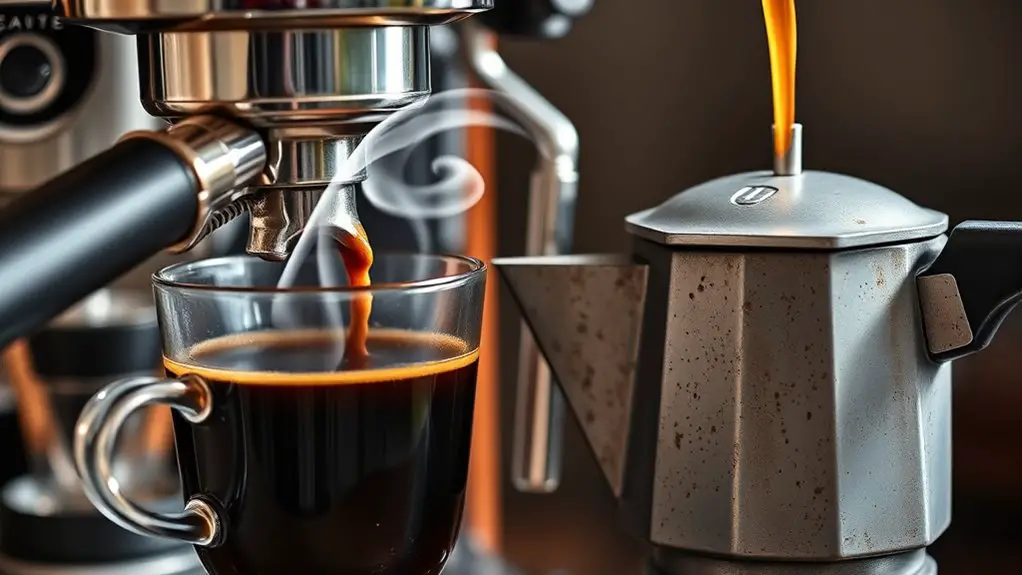When comparing espresso and Moka pots, it really comes down to your coffee preferences. Espresso machines deliver a concentrated, creamy texture with bold flavors, thanks to their high-pressure brewing. In contrast, Moka pots offer a rich, aromatic brew that's less intense but still satisfying. They're also simpler to use and clean. If you want to discover more about how these methods impact flavor and convenience, stick around for a deeper exploration.
The History of Espresso and Moka Pots
While both espresso and Moka pots have become staples in the coffee world, their histories reveal distinct origins and cultural significance. Espresso's origins trace back to early 20th-century Italy, where the desire for a quick caffeine fix led to the development of high-pressure brewing methods. This innovation not only changed how coffee was consumed but also shaped social interactions around it. In contrast, the Moka pot evolution began in the 1930s with Alfonso Bialetti, who aimed to make espresso-like coffee accessible at home. Its design reflects Italian culture, emphasizing simplicity and practicality. Both methods embody a unique narrative, showcasing how coffee can bridge tradition and modernity, inviting you to explore their rich legacies.
Brewing Techniques: Espresso Machines vs. Moka Pots
Although both espresso machines and Moka pots serve the purpose of brewing coffee, their techniques and results differ markedly. Espresso machines utilize high pressure to force hot water through finely ground coffee, creating rich flavors through advanced extraction methods. In contrast, Moka pots rely on steam pressure generated from boiling water, leading to a different brewing experience.
- Pressure differences: Espresso machines use 9 bars; Moka pots use less.
- Extraction methods: Espresso's rapid extraction vs. Moka's slower process.
- Grind size: Espresso requires fine grounds; Moka needs coarser.
- Brewing time: Espresso takes about 25-30 seconds; Moka pots take a few minutes. Additionally, incorporating vanilla extract into either brew can enhance the flavor profile without adding excess calories.
Understanding these distinctions can help you choose the right method for your coffee preferences.
Flavor Profiles: Comparing the Final Results
When you compare the final results of brewing coffee with an espresso machine and a Moka pot, you'll notice distinct flavor profiles that reflect their unique brewing methods. Espresso delivers a higher flavor intensity, characterized by rich, bold notes and a creamy texture, thanks to the pressurized extraction process. In contrast, the Moka pot produces a robust, yet slightly less intense flavor, with a more pronounced bitterness and a lighter body. Aroma differences are significant too; espresso often presents a complex bouquet of scents, while the Moka pot's aroma may be simpler, emphasizing earthy and chocolatey undertones. Ultimately, your preference will depend on whether you seek an intense, concentrated experience or a more laid-back, flavorful brew. Additionally, the brewing techniques used in each method greatly influence the final taste, accentuating the unique qualities of the coffee.
Ease of Use and Maintenance
Considering your daily routine and preferences, the ease of use and maintenance for both espresso machines and Moka pots can greatly influence your coffee experience.
- Espresso machines offer quick brewing but require more setup.
- Moka pots are simple to use, making them ideal for busy mornings.
- Cleaning tips for espresso machines often involve descaling and regular part maintenance.
- Moka pots usually just need a rinse, enhancing user experience.
Ultimately, if you value convenience and minimal upkeep, a Moka pot might be your best bet. However, if you're willing to invest time for a richer espresso experience, a machine may be worth it. Understanding these factors can empower your coffee choices and streamline your daily ritual. Additionally, for those with stomach ulcers, choosing coffee substitutes like chicory root can help avoid irritation while still enjoying a coffee-like flavor.
Which Method Suits Your Coffee Preferences?
How do you prefer your coffee experience? Understanding your coffee preferences and brewing styles can help you decide between espresso and a Moka pot. Espresso offers a concentrated, robust flavor with a creamy texture, ideal for those who appreciate a strong coffee kick. On the other hand, the Moka pot delivers a rich, aromatic brew that's slightly less intense, perfect for leisurely mornings. Both methods can utilize the same coffee grounds, but the brewing methods affect the taste and quality of coffee, showcasing the importance of brewing methods in your decision.
| Brewing Method | Characteristics |
|---|---|
| Espresso | Bold, intense, creamy |
| Moka Pot | Rich, aromatic, smooth |
If you enjoy experimenting with flavors and textures, espresso may suit you better. However, if you favor a more traditional, less intense brew, the Moka pot could be your go-to choice.
Frequently Asked Questions
What Coffee Beans Are Best for Espresso and Moka Pots?
When choosing coffee beans, opt for espresso blends rich in flavor and acidity for espresso machines. For moka pots, select moka pot beans with a balance of sweetness and body, enhancing your brewing experience markedly.
Can I Use Pre-Ground Coffee in Both Methods?
You can use pre-ground coffee for both methods, but it may compromise the flavor profile. While it offers convenience, freshly ground beans typically enhance the richness and complexity of your brew, providing a superior coffee experience.
How Do Water Quality and Temperature Affect Brewing?
Water quality greatly impacts brewing. Hardness can affect extraction, while brewing temperature influences flavor intensity. Ideally, aim for filtered water and maintain ideal temperatures around 195°F to 205°F for the best coffee experience.
What Are the Common Mistakes to Avoid When Brewing?
Picture a barista juggling coffee beans—common mistakes include incorrect grind size and inadequate brewing time. These factors can ruin your brew's flavor. Pay attention to them, and you'll elevate your coffee experience greatly.
How Do Espresso and Moka Pot Coffees Compare Nutritionally?
When comparing espresso and Moka pot coffees, you'll find espresso generally has higher caffeine levels, while both have low caloric content. This makes them both appealing choices for those mindful of their energy and intake.
